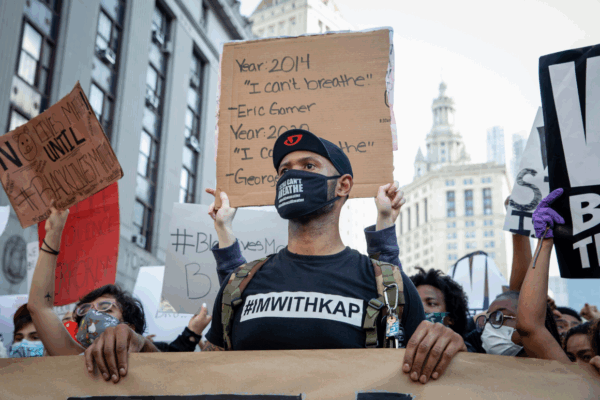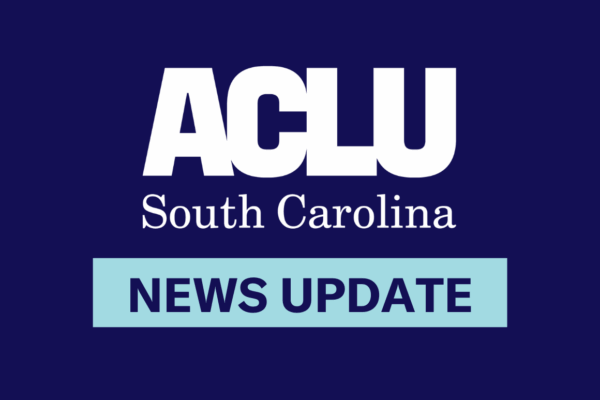Police Practices
All police agencies -- from the state patrol to city police forces -- need to respect the rights of individuals while enforcing the law.

Our fear of violent street crime should not blind us to the profound evil that is perpetrated when those sworn to uphold and enforce the law themselves become lawbreakers.
— John A. Powell, former ACLU National Legal Director
Police have the vital and difficult job of protecting public safety. Performing this job effectively does not require sacrificing civil liberties. All police agencies -- from the state patrol to city police forces -- need to respect the rights of individuals while enforcing the law. And when allegations of misconduct arise, there must be policies and mechanisms to hold police accountable for their actions.
The Latest

Take Action Now Against Expanded Policing in Charleston
Over the past two months, police in Charleston have shown that they are less concerned with serving and protecting our communities and more concerned with waging war on the people who live in them.Nearly two months ago on May 31, police in Charleston participated in mass police violence in Marion Square and the Eastside neighborhood, deploying potentially lethal weapons against peaceful protestors and community members. Charleston Police Department Chief Luther Reynolds and Charleston County Sheriff Al Cannon continue to ignore community calls for an apology and investigation into their officers’ actions. The incidents themselves and leaders’ subsequent dismissal of the harm they have caused has deepened already-existing community distrust for police revealed by the racial bias audit of the Charleston Police Department.Earlier this week, the Charleston Police Department, Charleston County Sheriff's Office, and the South Carolina Law Enforcement Division (SLED) announced plans to increase police actions in Charleston, including “pop-up traffic checkpoints” and the activation of the SWAT team for “proactive interdiction patrol,” which the Charleston Police Department defines, in part, as targeting “high-crime areas.” This expansion is happening before a backdrop of nationwide violence from local law enforcement and federal agents against people protesting police brutality and racist policing.No matter what the police say, these actions will not make our community safer. Instead, they will further criminalize Black, Brown and poor people, who are already disproportionately targeted by police in Charleston, and deepen distrust for police in communities that are most impacted by police violence.Despite months of sustained activism against police brutality and targeted over-policing in Black and Brown communities, Chief Reynolds last week asserted that “people don’t want us to depolice, quite the opposite.” In the birthplace of America’s first police force which was originally established as a slave patrol, Chief Reynolds’ claim is a direct dismissal of the outcries of Black people who, for centuries, have been oppressed by the racist foundation and structure of policing in Charleston.On Friday, we joined more than a dozen community partners in signing onto Black Liberation Fund’s open letter to the Charleston Police Department, Charleston County Sheriff's Department, and SLED calling on leaders to listen to people who are targeted by police violence and to stop waging war on Black communities.Now we need your help to ensure that this message is heard loud and clear.Join us in calling on Charleston city leaders to block this police expansion and, instead, to allocate additional resources to things that will actually improve public safety, like ensuring all people have a roof over their head, comprehensive healthcare, a living wage, and quality public education.Here is what you can do:

ACLU of South Carolina Statement on Dangerous Police Expansion in Charleston
Issue Areas:
Police Practices

ACLU of South Carolina Statement on Dangerous Police Expansion in Charleston
Yesterday the Charleston Police Department and Charleston County Sheriff's Office announced plans to increase police actions in Charleston, including ‘pop-up traffic checkpoints’ and the activation of the SWAT team for proactive interdiction patrol.We know what happens when police go down this road, it’s not new. All this will do is further criminalize Black and poor people. For example, while research shows that Black and white people use marijuana at roughly the same rate, Black people are 4.2 times more likely to be arrested for marijuana possession in Charleston County.This police escalation comes nearly two months after Charleston area law enforcement departments participated in mass police violence on May 31 in Marion Square, deploying potentially lethal weapons against people peacefully protesting for racial justice and against police violence. And, later that night area law enforcement continued their violence against Eastside community members. Yet, the Charleston Police department and Charleston County Sheriff’s Office continue to ignore community calls for an apology and investigation into their officers’ actions.The activation of SWAT for proactive interdiction patrols signals an additional concern. As the ACLU found in its report, War Comes Home: The Excessive Militarization of American Policing, the militarization of policing escalates the risk of violence, undermining civil liberties and disproportionately harming Black people.Special Weapons and Tactics teams, commonly known as SWAT, were first created in the late 1960s to address imminent, violent situations that regular law enforcement officers were untrained for, such as hostage and active shooter situations. In the 1980s, approximately 20 percent of small towns in the U.S. had a SWAT team. By the mid-2000s that number had jumped to 80 percent, and by the late-1990s almost 90 percent of large cities had them. The number of SWAT raids also grew at an astonishing pace, from approximately 3,000 a year in the 1980s to approximately 45,000 a year by the mid-2000s. In addition to the massive uptick in their deployment, the mission of SWAT teams has also drastically changed.According to the ACLU's report, as of 2013 79 percent of SWAT deployments were for the purpose of executing a search warrant while only 7 percent were for imminent, violent situations.The deployment of SWAT teams for proactive interdiction patrols shows that Charleston’s police and sheriff’s departments are less concerned with serving and protecting our communities, and more concerned with waging war on the people who live in them.Policing does not make our communities safer — experts have noted that there is no correlation between the number of police and crime rates. Yet, we continue to pour billions of dollars into our police and criminal justice system each year. If our society truly wants to stop the murder and other forms of violence against Black people by police and actually make our communities safer then we must invest in people and communities instead of police and prisons. This will not fix all of our injustices, but it will be a major and necessary start.

OP ED: Beyond Banning Chokeholds
This op ed was published by The Times and Democrat on July 12, 2020. Read the full piece here.Orangeburg City Council approved a resolution prohibiting police officers from using chokeholds and strangleholds. The resolution, which was initiated and championed by the Orangeburg Department of Public Safety, also updates the department’s use-of-force policy to require officers to intervene if they witness a fellow officer behaving in a way that is inappropriate, illegal or in violation of department policies.
Stay Informed
Sign up to be the first to hear about how to take action.
By completing this form, I agree to receive occasional emails per the terms of the ACLU’s privacy statement.
By completing this form, I agree to receive occasional emails per the terms of the ACLU’s privacy statement.
